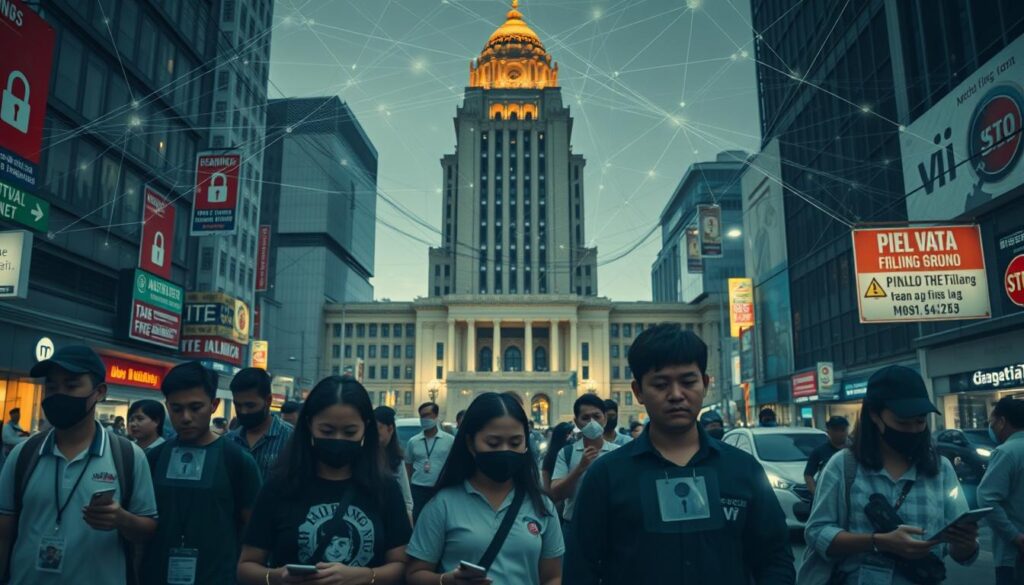Are you sure your attendance management follows data privacy laws? Or are you taking risks that could harm your business? It’s crucial for small and medium enterprises (SMEs) in the Philippines to follow these laws closely. This is because handling employee data correctly is key to avoiding legal trouble and keeping your reputation intact.
Using modern attendance management software is a smart move. It makes tracking easier and helps you follow the rules. By focusing on data privacy and tracking, you create a system that works well and is trustworthy.
Key Takeaways
- Compliance with data privacy laws is essential to protect employee data.
- Modern software solutions can simplify attendance tracking while ensuring regulatory compliance.
- Neglecting data privacy can lead to serious legal and reputational issues.
- Understanding laws such as GDPR and CCPA is critical for effective attendance management.
- Regular audits and employee training are vital to maintaining compliance.
The Importance of Data Privacy in Attendance Management
Data privacy is key in attendance management systems. It affects how companies handle employee data. About 90% of companies use tracking software and worry about protecting data. This shows that data privacy is not just a law, but a must for businesses.
Being open about personal data builds trust between workers and bosses. This is important for a good work environment.
But, many employees, about 67%, don’t know how their data is used. Ignoring data protection can harm a company’s reputation and lead to legal issues. For example, not doing privacy checks can put 40% of companies at risk of big fines.
In the Philippines, companies must follow strict data protection rules. They must handle attendance and payroll data carefully to avoid legal problems. Strong security measures protect employees and the company’s interests.
Companies that focus on data privacy see better trust and engagement from employees. About 50% of companies see a big difference. With 80% of employees wanting to know how their data is used, companies should promote a culture of security.
This helps fight cyber threats to attendance and payroll systems. It keeps sensitive information safe.
Understanding Relevant Data Privacy Laws
Businesses in the Philippines need to know about data privacy laws and compliance. The Data Privacy Act of 2012 is key in protecting personal info. It tells companies to keep employee data safe.
Even though the Philippines has its own rules, global laws like GDPR and CCPA matter too. These laws don’t directly apply here but show the need to stay updated. Knowing these laws helps companies follow both local and international standards.
Ignoring these laws can lead to big problems. Over 40% of businesses face fines for not keeping records right. This can cause legal issues and money losses. So, it’s vital for companies to follow these rules well.
In short, knowing data privacy laws is key for any business. By following these rules, companies can avoid fines and build trust with their employees.
| Data Privacy Law | Key Features | Impact on Attendance Management |
|---|---|---|
| Data Privacy Act of 2012 | Protects personal information; mandates data subject rights | Encourages responsible data handling and secure attendance tracking |
| GDPR | Regulates data processing for EU citizens; strict consent requirements | Informs global practices and raises standards for local compliance |
| CCPA | Allows consumers to opt-out of data selling; mandates transparency | Strengthens local accountability; sets a precedent for data privacy |

The Role of Compliance in Attendance Management
Compliance in attendance management is key for companies to follow the law and protect their workers. Having clear attendance rules helps avoid legal problems. Companies that focus on attendance management see better workflow and clearer rules.
HR managers are important for keeping rules in place. Training for managers and workers helps everyone understand the rules. This makes sure everyone is treated fairly at work.
Checking attendance records often is crucial. It helps spot any problems and keeps everyone on track. Keeping up with new laws is also important. This way, companies can avoid big fines.
Using advanced systems for tracking attendance helps keep records accurate. These systems make it easier to manage and cut down on mistakes. Keeping detailed records helps protect the company in case of disputes over pay.
| Compliance Benefits | Impact on Employee Engagement |
|---|---|
| Improved clarity in attendance policies | 20% increase in employee satisfaction |
| Reduced administrative errors through automation | 15% reduction in payroll errors |
| Regular audits identify discrepancies | 30% decrease in compliance-related issues |
| Consistent enforcement prevents favoritism | 25% increase in policy adherence |
In short, following the law in attendance management is crucial for a company’s integrity and a good work environment. By having the right policies and systems, businesses can lower risks and create a positive workplace.
Challenges in Data Privacy Compliance for Attendance Systems
Small and medium enterprises in the Philippines face big data privacy challenges with attendance systems. They often use old methods that need a lot of manual work. This makes it hard to keep accurate records, leading to problems with following the rules.
Businesses struggle to keep up with data breaches, as attendance systems collect sensitive biometric data. More than half of companies don’t have good ways to track employee leaves and absences. This causes both headaches and legal issues.
Employee feelings also play a big role. Many workers don’t trust how their data, like biometric information, is used or shared. This makes it tough for HR to balance being open while keeping data private.
Lastly, new data protection laws make it hard for companies to follow the rules. Businesses often find it hard to keep up with changing laws about personal data. This requires a lot of learning and adjusting, adding to the stress of meeting legal standards.

Key Regulations Affecting Attendance Management
It’s crucial to know the key regulations for good attendance management. Following the right laws helps keep data private and builds trust with workers. The General Data Protection Regulation (GDPR) and the California Consumer Privacy Act (CCPA) are key. They guide how to use personal data in a responsible and clear way.
General Data Protection Regulation (GDPR)
The GDPR is a big data privacy rule that affects businesses worldwide. Companies need clear consent from people before using their personal data. It also gives people the right to see their data and ask for changes or to delete it.
Not following GDPR can lead to big fines. These fines can be up to €20 million or 4% of a company’s yearly income, whichever is more. Knowing this helps manage attendance data better.
California Consumer Privacy Act (CCPA)
The CCPA boosts privacy and protects consumers in California. It lets people know what data is collected and why. It also gives them rights over their data.
Companies must follow CCPA to avoid lawsuits and fines. It’s important for those managing attendance to understand CCPA. It affects how personal info is used and impacts employee relations.
Best Practices for Ensuring Compliance
Protecting employee information is key in attendance management. Companies must focus on data minimization and getting employee consent. These steps create a safe and open work environment. They also build trust with employees about their data.
Data Minimization Strategies
Data minimization means only collecting what’s needed for attendance tracking. This lowers the risk of data breaches. The benefits include:
- Reduction of storage costs: Not storing extra data saves money. Digital storage can cut costs by 30-50%.
- Compliance with regulations: Collecting only necessary data keeps companies in line with laws. This reduces legal risks by up to 80%.
- Decreased risk of errors: With less data, attendance records are more accurate. This means fewer than 30% of records are wrong.
Obtaining Employee Consent
Getting employee consent is vital for data privacy laws. Companies must tell employees how their data will be used. Key points include:
- Transparency: Being open about data use builds trust and accountability.
- Informed decision-making: Employees should know and agree to data handling before it’s collected.
- Facilitating trust: Respecting privacy boosts morale and satisfaction by 20%.

Utilizing Technology for Better Compliance
Technology is key in improving data privacy in attendance management. Using modern attendance management software helps organizations manage employee data well. It also makes sure they follow data protection laws.
Systems with strong data security measures like encryption and user controls reduce risks. This is because they prevent unauthorized access to data.
More companies are using cloud-based solutions for their ease and scalability. These platforms help follow *technology for compliance* by standardizing data storage. They also make it easier to follow GDPR by automatically deleting data when it’s no longer needed.
Getting comprehensive attendance management software can greatly reduce compliance issues. For example, it can automatically delete visit data with software updates. It also helps by using unique user credentials to prevent data leaks.
Adding mobile apps to attendance management solutions makes things more convenient and secure. These apps improve user experience and let employees track their attendance in real-time. This reduces errors from manual methods. Since 74% of HR professionals see the value in compliance-focused tech, using such software is essential for keeping organizations strong.
How to Monitor Compliance in Attendance Management
Keeping an eye on attendance management compliance is key for any organization. It ensures they meet data privacy laws. Regular checks on attendance practices and records help spot problems and improve over time. A good plan includes audits and checking attendance data to meet legal standards.
Regular Audits and Assessments
Regular audits are vital for keeping attendance management systems in line. They show how well an organization follows data privacy laws and its own rules. By looking closely at attendance records, companies can find and fix issues that might harm their work.
Companies that do regular audits often see big benefits. They cut down on mistakes in tracking attendance by a lot. Using automated systems can improve compliance by over 35% with overtime and leave rules. This means fewer chances of facing penalties or legal trouble.
In the Philippines, small and medium businesses gain a lot from switching to automated attendance systems. They save a lot of time and boost productivity by about 25%. This lets HR teams do more important work instead of just keeping records.
Doing these audits helps meet legal needs and builds a culture of responsibility. When employees know they’ll be checked, they’re more likely to log their time correctly. This helps the company’s image and makes work run smoother.
Employee Training and Awareness
Effective employee training is key to good data privacy compliance in attendance management. Training sessions help employees understand their roles in keeping data safe. A study shows 64% of employees worry about data security because of past scandals. So, it’s crucial to have good compliance training.
It’s important for companies to offer training that meets everyone’s needs. Workshops and online courses can teach employees about data protection. Since over 50% of remote workers use personal devices, training is more important than ever.
The table below shows why regular training is so important:
| Statistic | Implication |
|---|---|
| 67% of cyber attacks target remote workers | Increased need for training on data privacy and protection. |
| Organizations without data training face significant penalties | Legal compliance is critical to avoid financial repercussions. |
| Majority of data breaches occur due to human error | Training can mitigate risks associated with negligence and unawareness. |
| Regular training updates reduce legal risks | Staying informed on changes in policies is vital for compliance. |
| Lack of commitment to data privacy affects employee trust | Essential for organizations to foster a culture of privacy and security. |
Adding compliance training to employee development boosts morale and job satisfaction. Companies that don’t train well risk losing trust and reputation. Using Learning Management Systems (LMS) helps manage training effectively.
Custom training programs can lower data breach risks. Regular quizzes and exercises keep employees informed. This makes the workforce proactive in handling data responsibly.
Data Privacy, Compliance, Attendance Management: The Best Approach
Combining data privacy with attendance management needs a clear plan. This plan must follow laws and protect employee rights. Companies should use the best ways to follow rules by making privacy a part of their work.
New attendance management solutions help businesses work better while keeping data safe. With big fines for breaking rules, it’s crucial to follow strict rules. For example, the EU’s GDPR has led to huge fines, showing how important data protection is.
To build a strong compliance culture, focus on these key points:
- Keep training employees on data privacy. Regular training helps staff handle sensitive info safely, reducing risks.
- Use technology to keep data safe with encryption and masking. These steps protect data and show a commitment to following rules.
- Do regular checks to make sure you follow data privacy laws. This helps you keep up with changing rules quickly.
Creating a culture that values compliance helps businesses deal with different laws. The California Consumer Privacy Act (CCPA) is an example of a law that affects big businesses. As new laws come, keeping up can be hard.
It’s very important to have a good attendance management solution. Make sure your policies include strong compliance steps. This way, everyone in the company knows how important data privacy is.
Using advanced tools for compliance can really help avoid problems with data privacy. For more tips, check out guides on employee tracking solutions that follow these ideas.

In short, combining the best compliance methods with data privacy and attendance management makes businesses ready for the future. Creating a culture that values awareness and compliance can turn data management into a key asset for any business.
Conclusion
Understanding data privacy and compliance is key for good attendance management today. Companies can face big fines for not following rules, up to 4% of their yearly earnings under GDPR. Also, data breaches can cost a lot, about $3.86 million on average. This shows how important it is to have strong plans to protect personal info.
Small and medium businesses in the Philippines can follow best practices to stay safe. This includes using less data, doing regular checks, and training employees. These steps can lower risks and make work better. Taking a proactive stance on following rules can also build trust with employees, who worry about their data privacy.
As technology gets used more, tools like AI for security can help a lot. They can spot threats better. Also, controlling who can access data can lower risks of unauthorized access. Being open and clear about how data is used can help companies follow the Data Privacy Act. It also makes a better work place for everyone to grow and do well.
